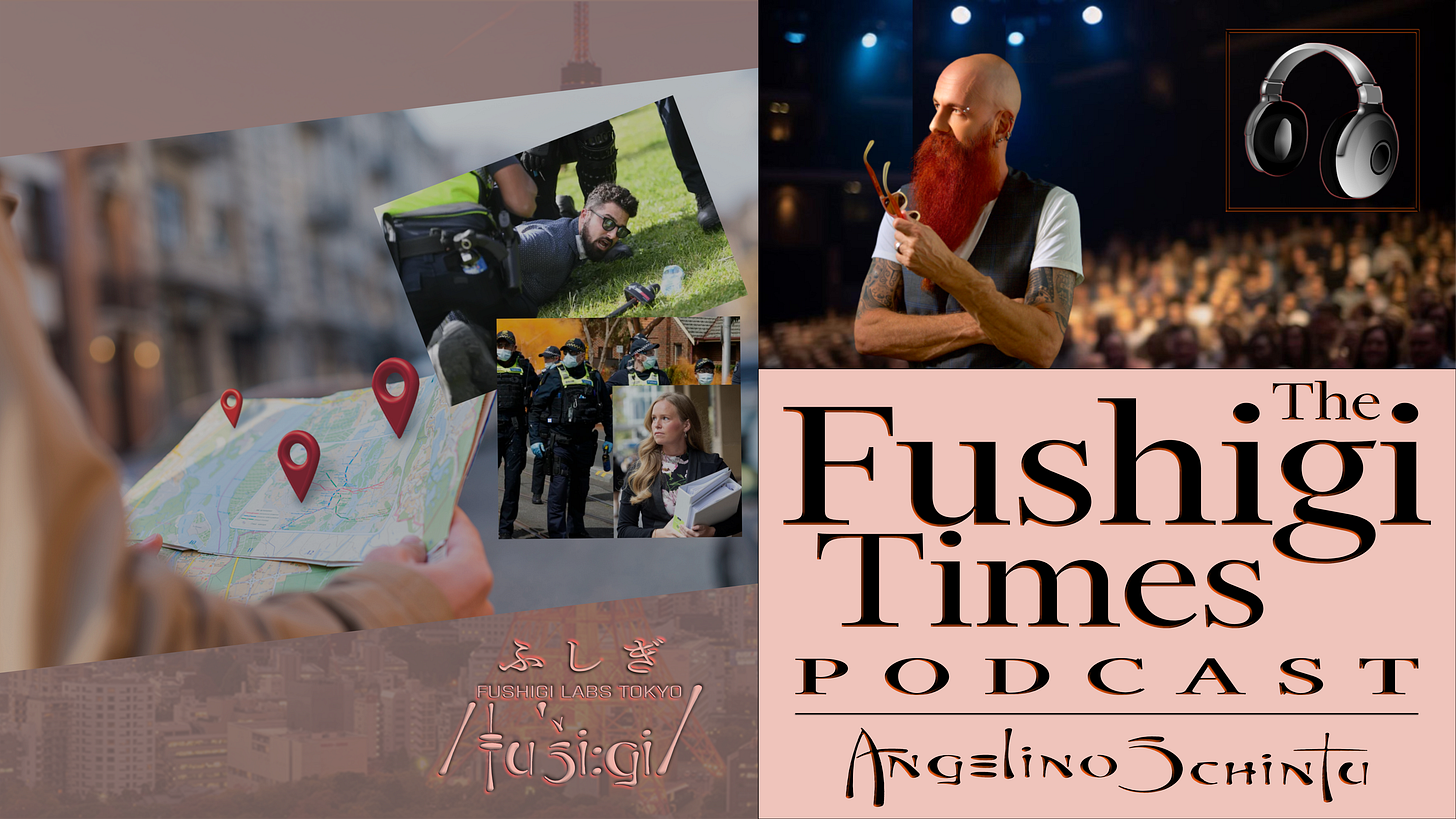This Slow Media content is supported by [YOUR ORGANISATION NAME HERE] and is best viewed in a browser.
In This Episode
From Tokyo to Melbourne, the pandemic’s legacy isn’t retold through infection rates or political spin, but through the quieter reckoning now unfolding beneath the numbers.
Across courtrooms, parliaments, and family dinner tables, faith in “the science” gives way to a more difficult conversation about data, power, and the price of obedience (forced or otherwise).
In these fushigi times, the real contagion isn’t a virus, but whoever is wielding power in the numbers game.
Scroll down to read the FULL article
Production Credits
Creator / Writer / Presenter: Angelino Schintu
Produced, Recorded & Engineered at: Fushigi Labs Tokyo
Opening & Closing Voice / Audio Production: Thomas Kinkaid
Theme Music: Original composition Fushigi by Andrew P Partington
PARTNERSHIP OPPORTUNITY
This Slow Media content is supported by [YOUR ORGANISATION NAME HERE]
The Fushigi Times is committed to offering thoughtful, independent, reality-grounded perspectives on global affairs, cultural explorations, and creative thought—made possible with the occasional support from like-minded partners.
...brief Sponsor description...
If there’s a friend, colleague, or fellow traveller you think might enjoy listening to this podcast, consider sending a link their way — subscribing costs nothing, the content is free forever, and it helps keep this Slow Media project alive and growing.
Post-Vax Reckoning: The Silence is Breaking
In the years since the initial roll‑out of the COVID‑19 vaccines, public discussion has never really gone quiet. What began as a crisis of infection morphed into a long‑running debate about mandates, data transparency, vaccine injuries, excess deaths, and above all, trust.
“In an age where data is king, truth often ends up in the dungeon.”
The conspiratorial fringe that was once dismissed as, well, fringe is now, in some parts, finding its concerns reframed in sober tones. The question no longer seems to be whether something went wrong, but how much, why, and who will take responsibility.
Here in Japan, the story has quietly shifted. While the government started out without coercion, there were no forced lockdowns or mandatory vaccinations, in mid‑2024 the tectonic plates beneath the public health narrative began to settle differently.
In March 2023, a government health panel formally stated that in the case of a 42‑year‑old woman who died following a booster shot of the Pfizer vaccine, a causal link “cannot be denied.” Later, in July of that year, a second case was acknowledged: a teenage girl who died after a third inoculation was deemed to have had an “undeniable” causal link.
To date, more than 2,000 reported deaths following vaccination have been evaluated but causality has only been officially acknowledged in those two cases.
Add to that a striking 2025 report noting a significant increase in excess deaths in Japan during 2022 and 2023, a period that overlaps with the highest uptake of mRNA booster shots. Meanwhile, further investigations show that only about 10 percent of the approximately 2,075 post-vaccination death cases were given autopsies capable of assessing causality.
The effects of this data gap are clear: public confidence is fracturing.
Internationally, the picture is equally complex.
In the European Union, over 11,000 deaths were reported after COVID-19 vaccination by mid-2023, most reportedly involving the Pfizer vaccine.
But officials there have not formally confirmed any causal link.
However, by late 2024, a new parliamentary question referenced a peer-reviewed study reviewing autopsy data from post-vaccine deaths. That study suggested a high likelihood of causal links and called for more research. The contrast between “no confirmed link” and “high likelihood of link” points to a tipping point in the health-policy discourse.
What all this means for our original theme, data versus dogma, is unsettling. The data landscape has grown more complex and far less certain.
The very populations once dismissed as conspiracy theorists are now pointing to real-world data gaps, under-reported autopsies, incomplete disclosure, and what they argue is a muted official response. At the same time, mainstream health authorities continue to insist that the benefits of vaccination outweigh the risks, especially for older or vulnerable populations.
In the context of this article / podcast, which critiques how data has been used (and misused) in pandemic policy, these Japanese and European developments add fresh urgency. They confirm that the question isn’t simply: did harm occur? But rather: how do we investigate, account for, assign responsibility, and learn from it?
If even a few governments now admit a causal link between vaccination and death, then the assumption that nothing significant happened is no longer tenable.
In short: what we were told in 2021—that vaccination is safe, and dogma is science—is now being questioned in 2025. And not by the fringe, but by mainstream institutions themselves.
The spreadsheet may not have wept for the lost lives. But the silence is now broken. And the conversation about who pays for it, and who implements accountability, is just beginning.
The Pandemic: Data or Dogma?
“But the data...” That is the usual argument—ah, the blessed data! It was the north star of every televised press conference, the divine scroll upon which public health decrees were etched.
From the very beginning, governments around the world insisted they were merely “following the science.” But science, in the real world, is rarely the solemn priest we imagine it to be. It is more often a scrappy academic in a torn blazer, arguing with itself in a hallway full of half-baked theories and evolving models. What we got instead was dogma in a lab coat.
“Science is not a static truth. It is a method. And when data is selectively interpreted to support a policy agenda, it stops being science and becomes something else entirely: propaganda.”
The Victoria Experiment: Policy Unleashes the Riot Police
In Australia, the state of Victoria offered a particularly vivid demonstration of what can happen when data is weaponised. Premier at the time Dan Andrews (more recently referred to as Dictator Dan) presided over one of the longest and harshest lockdown regimes in the Western world. What began as a public health concern quickly transformed into something more sinister.
Police were empowered to enforce restrictions with an enthusiasm that bordered on the performative.
Protests were banned outright. A pregnant woman was arrested in her home for promoting a demonstration on Facebook.
Citizens were prevented from traveling more than 5 km from home. And in case you missed the punchline: under Victorian public health orders, employers were required to collect and record their workers’ vaccination status and prevent unvaccinated staff from working on-site—unless exempt. Non-compliance wasn’t just discouraged; it came with fines up to:
$11,000 for individuals
$110,000 for corporations per breach.
A far cry from mere guidance—this was policy with Godzilla teeth!
Victoria didn’t just flatten the curve. It steamrolled civil liberties in the process.
At what point, exactly, did we decide that bodily autonomy was negotiable if an Excel spreadsheet said so?
While critics were initially dismissed as conspiracy theorists or selfish anti-vaxxers, several court challenges have since shown that police overreach did, in fact, occur.
But the damage was already done. Jobs were lost. Families fractured. Trust in institutions eroded.
This wasn’t just a heavy-handed misstep. It was contested in court. Victoria Police were formally challenged over their lockdown enforcement actions, with judges acknowledging breaches of human rights and the unlawful treatment of peaceful protesters.
One of the most visible cases was that of activist and independent journalist Monica Smit, who was arrested and detained for her role in organising anti-lockdown rallies. Her legal battle drew international attention, not only for its civil liberties implications, but for the precedent it threatened to set, that questioning government policy could be met with detention rather than debate.
Joining the ranks of those challenging Victoria’s heavy-handed approach was Rebel Media reporter Avi Yemini.
Like Monica Smit, Yemini found himself on the receiving end of the state’s zero-tolerance policy, arrested while doing what journalists are meant to do: report the news. His account reads like a dystopian script: cleared by police checkpoints, holding a microphone, then abruptly shoved to the ground and handcuffed without cause.
The ordeal didn’t end there; that same night, police visited his home to deliver a chilling warning.
He was told that he was under surveillance and on a “list.” Undeterred, Yemini took Victoria to its highest court, fighting not just for himself but for every citizen whose civil liberties have been trampled in the name of public health.
In a rare admission, Victoria Police publicly apologized in July 2022 for unlawfully arresting Yemini during protests in the previous two years, acknowledging that he was wrongfully detained while performing his journalistic duties and expressing regret for the distress caused.
What this made abundantly clear is that public health policy didn’t merely authorise force. It actively shielded it.
The data was selectively interpreted, rigidly enforced, and never open to public interrogation. It became both the sword and the armour.
Once again, the numbers were never on trial. Only the people were.
Meanwhile in Japan: Compliance Without Coercion
I’m reporting from Tokyo, where the Covid response followed a markedly different path. My experience (and the contrast with Victoria’s) couldn’t be starker.
Here in Japan, the Covid response was curiously different, less dramatic on the surface, but no less socially complex. The government lacks the legal power to force lockdowns or mandate vaccinations. Yet compliance was near-total. People masked up. They stayed home. They lined up for vaccines. Not because they were forced to, but because that’s what Japan’s social contract demanded.
And yet, cracks are beginning to form in the carefully curated image of a harmonious public health response.
On May 31, 2024, Kazuhiro Haraguchi, a former Japanese Minister for Internal Affairs and Communications and current member of the House of Representatives, delivered an emotional speech at a large protest in Tokyo.
Referencing an apparent rise in post-vaccination deaths, he expressed deep regret for the grief and loss felt by many families. Minister Haraguchi apologised for the deaths and injuries he attributed to Japan’s COVID-19 vaccination rollout in the following words:
“I apologise to all of you. So many have died, and they shouldn’t have.”
The statistics, so far, remain buried or conveniently “under investigation,” but public curiosity is growing. Even in societies built on quiet consensus, the silence eventually gives way to questions.
As with so much else in the Covid era, the data here isn’t the issue. It’s how it’s being handled. A culture of deference cannot forever protect institutions from transparency.
The Data Dilemma: Who Gets to Decide What’s ‘True’?
It’s easy, and dangerously tempting, to get caught up in whether the vaccine data was “right” or “wrong.” Were side effects underreported? Was efficacy oversold? Did boosters really provide measurable benefit after the fourth round?
These are all important questions, and some will no doubt fuel academic journals and parliamentary inquiries for years to come. But this obsession with empirical purity misses a more immediate and concerning reality: governments used contested data to justify uncontested powers.
“The real problem isn’t bad data. It’s the infallible authority granted to whoever claims to possess the ‘right’ data.”
Take the international debate over vaccinating children. Robert F. Kennedy Jr., once widely dismissed as the patron saint of ‘medical skepticism,’ and now one of the most prominent and controversial figures in the US health debate, has long advocated halting Covid vaccinations for people under 18.
While his views have been challenged and often mocked in the American media, his influence as a top health commentator cannot be ignored.
Around the same time Kennedy called for a pause, Australia quietly adopted a near-identical policy, reflecting a similar skepticism about the risk-to-benefit balance for younger children.
Whether this was a coincidence, a response to shifting political winds, or an indirect influence remains unclear.
Other nations, including the UK, EU members, and Japan, also took varied, often cautious stances on child vaccination, though none publicly credited advocacy voices akin to Kennedy’s.
This overlap reveals the unsettling fluidity of what we call “settled science,” showing how health policy can pivot rapidly in response to evolving data, public pressure, and influential personalities.
Data Can Be Moulded Like Clay
Back in the early 2000s, I was news director and presenter at InterFM, a Tokyo-based English-Japanese radio station. Our morning show, The Zoo, had been the city’s top-rated program in its time slot for almost seven years. We had the numbers to prove it—or rather, we had numbers.
A senior salesperson walked into the studio one day, eager to pitch a major corporate sponsor on airtime during our flagship show. I asked how the client would be convinced. His answer was as honest as it was alarming:
“Don’t worry. I’ll look through the research and ratings data and I’ll find the numbers we need to impress the client.”
Translation: Not make them up. Not fake them. Just find them. He knew that somewhere, buried in the statistics, there would be a data point that suited the narrative. That’s the thing about data: it’s rarely wrong, but it’s often too broad, too messy, and too manipulable to tell only one story. It tells many. And people, especially the ones with power, choose which data gets the spotlight.
Politicians and policymakers are no different than advertising executives. They want results.
And if the data doesn’t immediately back them up, they won’t change the policy—they’ll change the interpretation.
Dissent as Disease: The Unvaccinated as the New Untouchables
Perhaps the most egregious failure of the Covid era was not the missteps of policy, but the treatment of dissenters. The unvaccinated were painted not merely as medically irresponsible, but as socially toxic.
They were anti-science, anti-social, anti-everything. In many Western democracies, they became the pandemic’s political scapegoats.
In Australia their exclusion from workplaces, restaurants, and even basic services was systematic. The justification? Public safety. The implication?
Bodily autonomy was no longer sacred, just another cell in a spreadsheet, overwritten by consensus between public health bureaucrats and politically motivated policymakers.
It was never just about health. It was about obedience.
Dissent was framed not as a democratic right, but as a threat to the collective.
And once that logic takes hold, there are very few limits to what governments can (and will) do.
Truth vs. Usefulness: The Tyranny of ‘Actionable Data’
Governments don’t need accurate data to act. They just need actionable data. That’s information clear enough to justify a decision, ambiguous enough to dodge accountability, and politically useful enough to survive scrutiny, especially from fact-checkers and journalists asking the right questions.
We saw this pattern again and again during the pandemic. Data was used to enforce movement restrictions, determine employment eligibility, and create caste-like divisions in society. It was a world where the spreadsheet ruled, and anything that didn’t fit the pivot table was discarded.
And if you questioned the spreadsheet? You were accused of endangering lives.
What Now? Learning the Wrong Lessons
As the pandemic fades into memory a little more, a troubling trend persists: the policies it justified have set precedents. Emergency powers were normalised. Censorship was quietly encouraged. Civil liberties became bargaining chips. And all under the benevolent banner of public health.
If we don’t interrogate how data was used—not just whether it was true, but how its power was wielded—we are guaranteed to repeat the same mistakes.
Next time, the crisis may not be a virus, but climate change, terrorism, or some new frontier of digital or AI threat. The mechanism will be the same: data, fear, appeals to expert authority, shifts in government policy, new laws—and further erosion of the freedoms we once took for granted.
A Final Thought: The Spreadsheet Never Weeps
In the end, the real story of the pandemic is not one of virus and vaccine. It’s a story about control. About how easily freedom can be suspended when the right numbers are presented in the right way by the right people on the right podium.
“Spreadsheets don’t mourn lost jobs, broken families, or trampled freedoms. But history does.”
The remedy is clear: we must demand open disclosure of all the facts, warts and all, and allow the public to decide for themselves. No more data filtered through layers of political expediency. No more science weaponised as a blunt instrument. And no more silence around the hornet’s nest I’ve so far avoided mentioning: and that is commercial gain.
Transparency, honesty, and respect for individual rights cannot be the casualties of crisis management.
Restore Transparency, Restore Trust!
Only with full disclosure and open debate can democracy survive the next pandemic—or any other emergency disguised behind spreadsheets and data. Because in the end, truth, the actual facts must be a shared pursuit, not a tool of control.
📢Want to rebroadcast this?
This original content is part of our Slow Media canon — carefully crafted, independently produced. If you’d like to license, rebroadcast, or syndicate this podcast, let’s talk. We’re open to collaboration — as long as it stays thoughtful, grounded, properly credited… and paid for.
Slow Media Needs Slow Money…
















